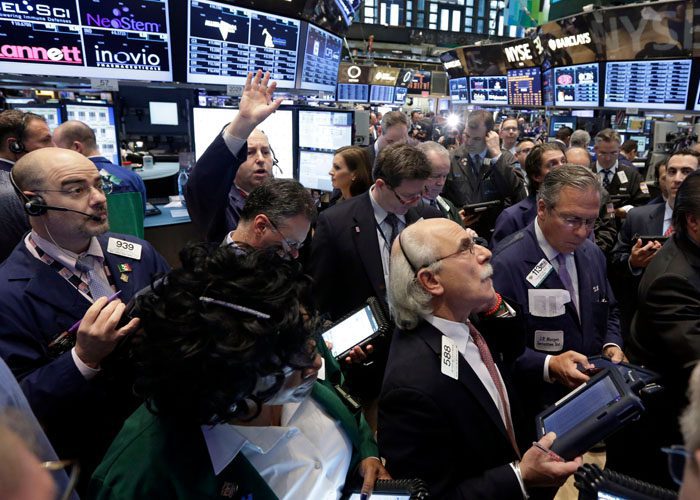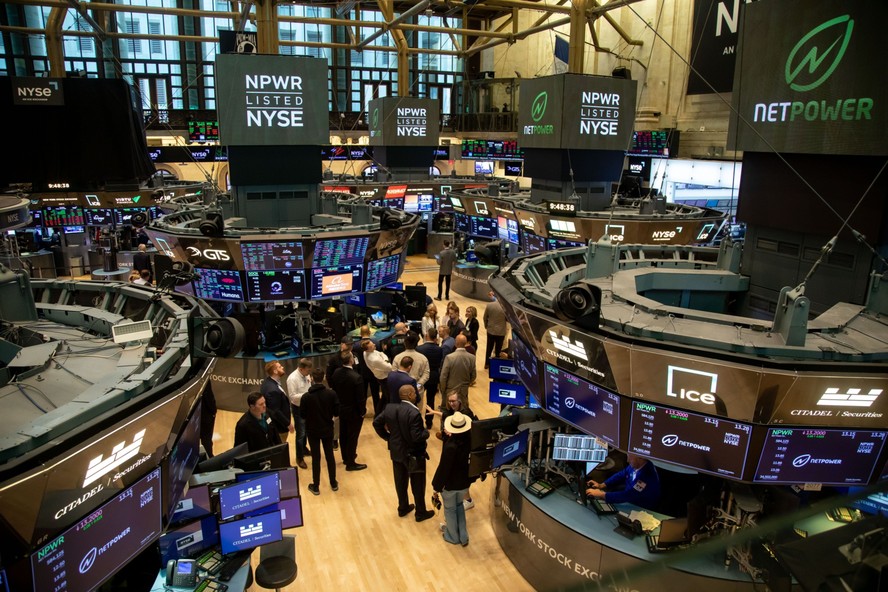
Wall Street Muted at Open as Investors Await Inflation Data
Wall Street Muted at Open as Investors Await Inflation Data: The stock market opened with a subdued tone, as investors braced themselves for the release of crucial inflation data. This anticipated data release is expected to significantly impact interest rates, economic growth, and corporate profits, making it a key factor influencing market sentiment.
The market’s muted response reflects the cautious approach adopted by investors, who are closely monitoring economic indicators and geopolitical events. The release of the inflation data is seen as a potential catalyst for significant market movements, with investors seeking to position themselves strategically ahead of the announcement.
Market Context: Wall Street Muted At Open As Investors Await Inflation Data
Wall Street opened muted on Wednesday, with investors awaiting the release of key inflation data for July. The market is in a state of cautious optimism, with investors trying to decipher the Federal Reserve’s next moves regarding interest rate hikes.
The recent performance of the stock market has been mixed, with major indices experiencing both gains and losses. The S&P 500 and Nasdaq Composite have shown resilience, demonstrating the market’s ability to absorb volatility. However, the Dow Jones Industrial Average has lagged behind, reflecting concerns about the health of the U.S.
economy.
Factors Influencing Market Sentiment
Several factors are influencing market sentiment, including:
- Economic Indicators:Inflation remains a key concern for investors, as high inflation erodes purchasing power and can lead to tighter monetary policy from the Federal Reserve. The recent decline in the consumer price index (CPI) has provided some relief, but investors are closely watching for signs of stickiness in inflation.
- Geopolitical Events:The ongoing conflict in Ukraine, tensions between the U.S. and China, and the potential for further geopolitical instability are adding to market uncertainty. These events can disrupt global supply chains, increase commodity prices, and create a sense of risk aversion among investors.
- Corporate Earnings:Corporate earnings reports continue to be a key driver of stock prices. Investors are looking for signs of strong earnings growth and positive guidance from companies, as this can indicate healthy economic conditions and future growth prospects.
Investor Sentiment and Trading Activity
Investor sentiment is currently cautious, with many investors taking a wait-and-see approach. This is reflected in the relatively low trading volumes seen in recent weeks. Investors are awaiting further clarity on the economic outlook and the Fed’s policy stance before making significant investment decisions.
The recent decline in interest rates has encouraged some investors to take on more risk, leading to a slight increase in trading activity. However, this is likely to remain muted until investors have a better understanding of the inflation outlook and the Fed’s plans.
Inflation Data Await

Wall Street remained muted at the open, with investors holding their breath for the release of the latest inflation data. This eagerly anticipated report, specifically the Consumer Price Index (CPI) for July, is expected to provide crucial insights into the trajectory of inflation and the Federal Reserve’s potential course of action.
Significance of Inflation Data
The CPI report holds immense significance for the market, as it serves as a key indicator of price pressures within the economy. This data point can influence a multitude of factors, including:* Interest Rates:The Federal Reserve closely monitors inflation data to gauge the need for further interest rate adjustments.
If inflation proves to be more persistent than anticipated, it could bolster the case for additional rate hikes, potentially leading to higher borrowing costs for businesses and consumers.
Economic Growth
Inflation can impact economic growth by eroding consumer purchasing power and dampening business investment. If inflation remains elevated, it could slow down the pace of economic expansion.
Wall Street opened cautiously today, investors holding their breath as they await the latest inflation data. Meanwhile, a growing chorus of voices is calling for a halt to the mRNA COVID jabs, citing evidence of unprecedented harm, as detailed in this alarming report by an MIT expert: mit expert calls for immediate stop of mrna covid jabs evidence shows unprecedented level of harm.
The uncertainty surrounding both the economy and the vaccine’s long-term effects is likely to keep the market on edge for the coming weeks.
Corporate Profits
Inflation can affect corporate profits by increasing input costs and squeezing profit margins. If inflation remains high, it could lead to a slowdown in corporate earnings growth.
Impact on Different Sectors and Asset Classes
The release of inflation data can have a ripple effect across various sectors and asset classes. Here’s a breakdown of potential impacts:* Bonds:If inflation proves to be stickier than expected, it could lead to a selloff in bonds, as investors demand higher yields to compensate for the erosion of purchasing power.
Equities
Wall Street opened in a subdued mood today as investors anxiously await the release of inflation data, which could significantly impact the Federal Reserve’s next move on interest rates. This uncertainty is amplified by the ongoing legal battle surrounding a meme featuring Hillary Clinton, which, as argued by an attorney in this recent case , could have chilling effects on free speech for all Americans.
The potential implications of this case on the First Amendment are a significant concern for many, adding another layer of complexity to the already volatile economic landscape.
High inflation can weigh on equity markets, as it increases costs for businesses and reduces consumer spending. However, certain sectors, such as energy and materials, could benefit from rising prices.
Commodities
Commodities are often seen as an inflation hedge, as their prices tend to rise with inflation. If inflation remains high, it could drive up the prices of commodities like oil, gold, and agricultural products.
Real Estate
Inflation can impact real estate markets by increasing borrowing costs and reducing affordability. However, strong demand and limited supply could support housing prices in the short term.
Wall Street’s Response
Wall Street opened the day with a muted response, mirroring the cautious sentiment surrounding the upcoming inflation data. While investors held back from making significant moves, a sense of anticipation permeated the market. This subdued activity was a stark contrast to the volatile swings seen in recent weeks, indicating a strategic approach from traders who were keen to observe the economic indicators before committing to any major trades.
Trading Volume and Activity
The muted market opening was reflected in the trading volume, which remained subdued across various sectors. This low activity suggests that investors were waiting for a clearer picture of the economic landscape before taking any decisive action. The absence of large-scale buy or sell orders indicated a cautious approach, with investors opting to remain on the sidelines until the inflation data was released.
“The muted trading volume reflects the market’s uncertainty surrounding the inflation data,” said [name of analyst/expert], a market strategist at [name of financial institution]. “Investors are waiting for a clear signal before committing to any major trades.”
Sector Movements, Wall street muted at open as investors await inflation data
While the overall market exhibited a muted response, certain sectors showed notable movements. The energy sector, for instance, experienced a slight uptick as oil prices rose on expectations of continued strong demand. Conversely, the technology sector remained relatively flat, reflecting investor concerns about rising interest rates and their potential impact on growth stocks.
The healthcare sector also witnessed a subdued response, with investors closely monitoring the upcoming inflation data and its potential implications for healthcare spending.
Investor Behavior
The muted open on Wall Street, with investors holding back ahead of the crucial inflation data release, offers a glimpse into the cautious sentiment dominating the market. Investors are acutely aware of the potential impact of the inflation figures on the Federal Reserve’s monetary policy decisions and the broader economic outlook.
This uncertainty has led to a noticeable shift in investor behavior, characterized by a heightened focus on risk management and strategic positioning.
Risk Appetite and Investment Strategies
The prevailing uncertainty surrounding inflation has prompted investors to adopt a more conservative approach to risk. This is evident in the subdued trading activity and the preference for defensive sectors, such as healthcare and utilities, which are perceived to be less susceptible to economic fluctuations.
Investors are also seeking to diversify their portfolios to mitigate potential losses from unexpected market movements.
“Investors are taking a wait-and-see approach, with many opting to stay on the sidelines until they have a clearer picture of the inflation landscape,”
said a senior market strategist at a leading investment firm. This cautious stance reflects a desire to avoid significant losses in the face of potential market volatility.
Wall Street opened muted today as investors wait with bated breath for the latest inflation data. Meanwhile, the political landscape continues to be turbulent, with Republicans alleging that the National Archives was told to suppress a statement regarding the document search related to President Biden’s time at the University of Pennsylvania, as reported by MolNewsNet.
This latest development adds another layer of uncertainty to an already volatile market, leaving investors unsure of how the economic and political landscapes will ultimately intertwine.
Strategies in Anticipation of Inflation Data
Investors are employing a range of strategies to navigate the uncertainty surrounding the inflation data release. These include:
- Short-term Trading Strategies:Some investors are utilizing short-term trading strategies to capitalize on potential price swings in response to the inflation data. This involves entering and exiting positions quickly, aiming to profit from short-term price fluctuations.
- Defensive Positioning:Others are adopting a more defensive posture by shifting their portfolios towards sectors that are less vulnerable to economic downturns. This might involve increasing allocations to sectors like healthcare, utilities, and consumer staples, which are seen as more resilient during periods of economic uncertainty.
- Option Strategies:Investors are also employing option strategies to hedge against potential market volatility. Options contracts provide the right, but not the obligation, to buy or sell an underlying asset at a predetermined price, offering a degree of protection against adverse price movements.
Trading Activity Trends
The anticipation of the inflation data release has resulted in heightened market volatility, with increased trading activity and wider price swings.
- Increased Volatility:The market has experienced a surge in volatility, with prices fluctuating more rapidly than usual. This is a reflection of the uncertainty surrounding the inflation data and its potential impact on the broader economic landscape.
- Shifting Investment Preferences:Investor preferences have shifted towards defensive sectors, with a decline in interest for cyclical sectors that are more sensitive to economic growth. This is indicative of the cautious sentiment prevailing in the market.
- Increased Trading Volume:The heightened volatility has led to an increase in trading volume, as investors actively adjust their positions in anticipation of the inflation data release.
Impact on the Economy

The release of inflation data can have significant ramifications for the overall economy, impacting consumer spending, business investment, and economic growth. The data also influences monetary policy decisions made by the Federal Reserve, which can have long-term implications for the economic landscape.
Impact on Consumer Spending
Inflation data directly influences consumer spending patterns. High inflation erodes purchasing power, forcing consumers to cut back on discretionary spending. This can lead to a decline in demand for goods and services, potentially impacting businesses and economic growth. Conversely, lower inflation can boost consumer confidence and encourage spending, stimulating economic activity.
Impact on Business Investment
Inflation can significantly impact business investment decisions. High inflation creates uncertainty for businesses, making it difficult to predict future costs and profits. This uncertainty can discourage investment, potentially hindering economic growth. Conversely, low inflation fosters a more stable business environment, encouraging investment and expansion.
Impact on Monetary Policy
The Federal Reserve closely monitors inflation data to guide monetary policy decisions. High inflation can prompt the Fed to raise interest rates to cool down the economy and control inflation. This can impact borrowing costs for businesses and individuals, potentially slowing economic growth.
Conversely, low inflation may encourage the Fed to maintain or lower interest rates, stimulating economic activity.
Long-Term Implications
Persistent high inflation can have long-term negative implications for the economy. It can erode the value of savings, discourage investment, and lead to economic instability. Conversely, sustained low inflation can foster economic growth and stability. The long-term impact of inflation data depends on the Fed’s response and the overall economic context.
Final Summary

The muted opening of Wall Street highlights the uncertainty surrounding the economic outlook. Investors are carefully assessing the potential impact of inflation data on various sectors and asset classes, seeking to navigate the evolving market landscape. The coming days will likely witness heightened volatility as investors react to the data release and its implications for the economy and financial markets.





